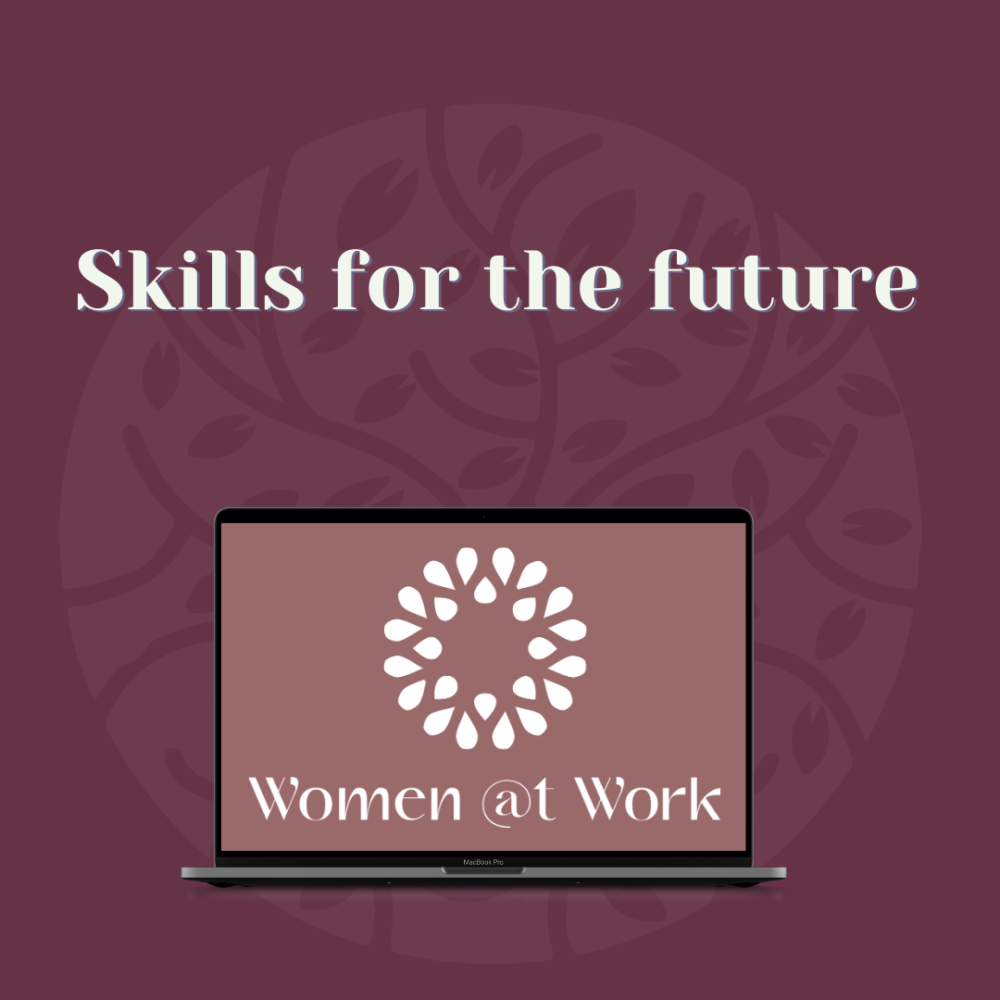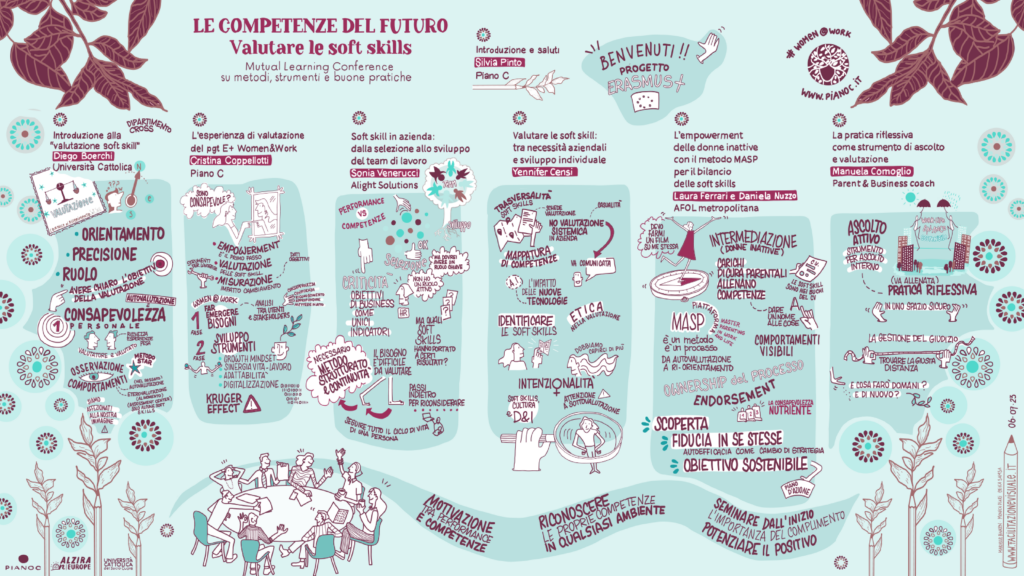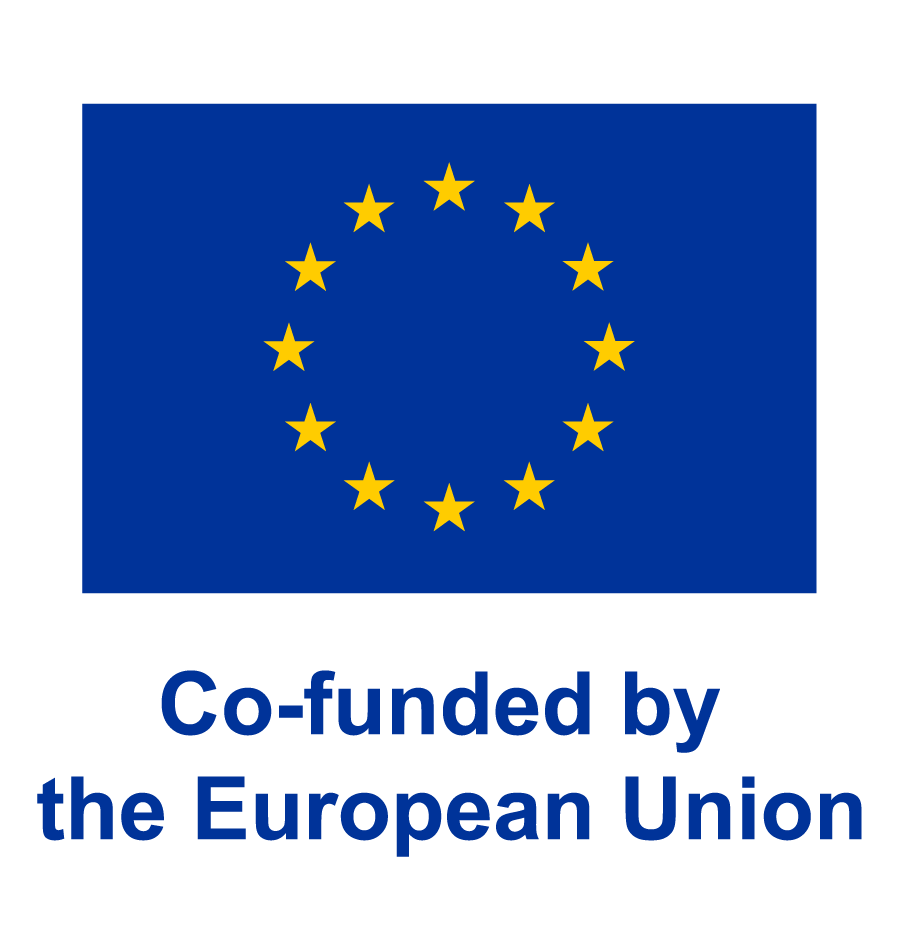
Women@Work, the project to enhance and strengthen women’s talents 6 Settembre 2023
How can training and guidance strategies be designed to respond even more effectively and timely to the challenges of women in today's labour market? We are doing this with Women@Work.
A new challenge for Piano C began in March with the launch of the European Commission-funded project Women@Work in cooperation with IDEA Alzira and the Catholic University – CROSS
The main goal is to enhance and strengthen women’s talents starting from objective data that bring together the needs of women jobseekers and the demand for increasingly digitalized professions through the implementation of two synergetic actions:
– improving services, training and re-employment paths by creating innovative methodological tools designed on the basis of real and concrete needs;
– create a common framework for the evaluation and validation of skills acquired in training courses.
In this way, it will be possible to design training and guidance strategies capable of responding in an increasingly effective and timely manner to the challenges of women in today’s labour market.
To whom it is addressed
The Women@Work project refers to three main target groups:
– guidance and training practitioners either belonging to the partner organisations and directly involved in the work programme and project actions, or present in other European organizations;
– women who are at different stages of their professional and employment pathways, representatives of “dispersed human talent” as they are unemployed, badly employed, economically and socially fragile or in a precarious situation; they are the main beneficiaries of this project;
– partner organisations: Piano C, Idea Alzira and Catholic University.
Women@Work project: Phase#1
In order to best design the tools, we started from an initial phase of detailed analysis of the current situation.
Through focus groups and questionnaires that involved trainers, digital specialists, professionals working with fragile female targets and our reference community, we mapped the training needs and requirements of women in the labour market. The goal: to bring out the new needs of women in the phase of re-employment in the labour market, both in terms of training needs, contents and delivery methods, and of empowerment and orientation.
At the same time, we carried out a contextual analysis of the digitization of the labour market to get an accurate map of what the jobs of the future will be thanks to the studies of CROSS the Research Centre on Orientation and Socio-Professional Development of the Catholic University of Milan.
This first phase was concluded with the creation of the Map of the training needs, a tool that encloses the results of the work, and the systematization of existing studies on trends related to the professions of the future and the digitization of the labor market.
The long-term purpose of this map is to give visibility and to analyse the difficulties and the technology-related gender gap that women face both in their phase of re-employment in the labour market and in their professional improvement. In the short term, the aim of this document is to provide keys to be taken into consideration when formulating training and guidance proposals to reduce the digital gender gap.
In addition, we discussed how we will work tomorrow, how leadership styles and organisational models will necessarily change, and how a ‘female’ reading of the world of work would give a more complete and effective picture of its evolutions with a real expert on the issue, Silvia Zanella: manager and author, named LinkedIn Top Voices for Work.
Women@Work: Phase #2
During the second phase of the project, “guidance toolkits for women’s empowerment in the digital age” were developed. Specifically, toolkits were created and then implemented through focus groups, to train the skills identified during phase #1 and considered important for women’s professional future:
- Growth Mindset: characteristics, advantages and training to this type of mindset
- Life-work synergy: in what it consists of and how to improve it through training the soft skills that make it up
- Adaptability: overcoming age discrimination in the workplace
- Digital Empowerment: unlocking the potential of women, how digital skills are revolutionizing empowerment around the world
The goal of these tools: to raise awareness about the need to enhance some of the top skills critical to the world of work and at the same time make women more aware of their training needs.
Women@Work: Phase #3
During the third and final phase of the project, work was done to create a self-assessment framework.
In collaboration with Diego Boerchi, Professor at the Catholic University of Milan, a questionnaire for the self-assessment of skills was created. Thanks to this tool it is now possible to keep track of progress in the work done on soft skills and therefore experience in a tangible and concrete way the improvements achieved.
Finally, in conclusion of the project, a webinar was held on July 6, “The Skills of the Future. Assessing Soft Skills,” during which not only the topic related to the importance of soft skills in the assessment of professional skills was explored in depth, but also useful methods and tools were shared to enable their objective measurement.
Through the form of Mutual Learning Conference there was an exchange that allowed learning from the speakers who shared their experiences. Methods, tools and best practices were discussed, there was a fruitful exchange of ideas and experiences regarding the assessment of soft skills from practitioners, stakeholders and trainers.
6 female speakers attended to bring their points of view:
- Cristina Coppellotti – Head of Training Piano C
- Sonia Venerucci – Regional HR – Operational Effectiveness Director Alight Solutions
- Yennifer Censi – Training and education expert with focus on D&I
- Laura Ferrari – Head of Orientation Service AFOL Metropolitana – Agenzia Metropolitana per la formazione, l’orientamento e il lavoro
- Daniela Nuzzo – Coach, trainer and orienteer AFOL Metropolitana – Agenzia Metropolitana per la formazione, l’orientamento e il lavoro
- Manuela Comoglio – Parent & Business Coach
Each speech was interspersed with the graphic facilitation presentation made by Marielle Binken and Erika Samsa of facilitazione visuale.

The project’s impact
Women@Work is a project aimed at making a real and tangible impact on two fronts:
– towards women seeking employment or wanting to re-enter the labour market,
– towards innovation of the accompaniment and orientation method of Piano C.
Thanks to the training and guidance tools developed, our beneficiaries was able to
– experience improved employability
– acquire empowerment,
– access better career prospects,
– increase their knowledge of labour market dynamics
– deepen their digital skills.
Thanks to the mapping of needs, the co-design of innovative training tools and the creation of an evaluation frame work Piano C will be able to
– develop innovative tools that are increasingly effective and in line with the needs that have emerged,
– refine and fine-tune the evaluation system for the results of empowerment, soft skills capacitation and short, medium and long-term impact.
Women@Work and Piano C
The Women@Work project is aligned with the development goals and strategies of Piano C, particularly in terms of measuring impact as well as addressing the training and redesign needs of women who want to find their place in the world of work.
Enhancing female talent is the key to full professional and personal fulfilment and the cultural transformation of the world of work.
Our main activity consists of providing professional re-design paths tested over the years, we have codified a precise and effective methodology based on the concepts of Design Thinking: Work Design.
One aspect to which we pay close attention concerns precisely the evaluation of the impact and effectiveness of our training products and the Work Design method. Thanks to the Women@Work project of which we were project leader and, to the collaboration with our partners, we can innovate and refine these techniques to give even more accurate and precise answers.

Funded by the European Union. Views and opinions expressed are however those of the author(s) only and do not necessarily reflect those of the European Union or the European Education and Culture Executive Agency (EACEA). Neither the European Union nor EACEA can be held responsible for them.
Finanziato dall’Unione europea. Le opinioni espresse appartengono, tuttavia, al solo o ai soli autori e non riflettono necessariamente le opinioni dell’Unione europea o dell’Agenzia esecutiva europea per l’istruzione e la cultura (EACEA). Né l’Unione europea né l’EACEA possono esserne ritenute responsabili.
Financiado por la Unión Europea. Las opiniones y puntos de vista expresados solo comprometen a su(s) autor(es) y no reflejan necesariamente los de la Unión Europea o los de la Agencia Ejecutiva Europea de Educación y Cultura (EACEA). Ni la Unión Europea ni la EACEA pueden ser considerados responsables de ellos.




Nessun commento